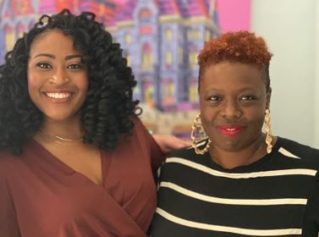Major hair companies, Revlon, Proctor & Gamble, Pantene, and L’Oreal have seen declined sales since 2009 because of lack of diversity in their hair products. As the world is becoming more diverse (just Thursday a study declared whites are no longer the majority), so are the hair needs for women of color.
If needs are changing, then cookie cutter products aren’t going to satisfy the ever-changing demographics, hence declined product movement. Though many of these leading companies have produced lines to cater to non-whites, the specificity isn’t accommodating enough to meet the needs of innate curly heads, especially when the (black) competition understands the hair they are making products for.
Having accessibility to multifarious how-to and what-works YouTube videos and practically having a product that suits every possible hair want makes for a certified loss for any company that doesn’t keep up with consumers’ demands.
Carol’s Daughter, a leading veteran natural hair care line, launched the Transitioning Movement site with singer-model Solange Knowles to help guide women through the oft-distressful and challenging process of going natural after twenty years or more of being one with some sort of chemical relaxer. There’s a duality in this method: informing their base while increasing their market—smart, smart, and smart!
While the likes of Proctor & Gamble and others have had a head start on shrouding the multi-million dollar hair care market, women of color are leading the charge in a progressive and take-charge way. Carol’s Daughter, Miss Jessie’s, Karen’s Body Beautiful, Qhemet Biologics, Oyin Handmade, and Kinky-Curly are all leaders in journeying through the natural hair phases. And each is independently-owned!
Once there was a need to get major retailers to carry black care hair care and skin products on their shelves as led by Rainbow Coalition/PUSH, activist Rev. Jesse Jackson in the 1970’s and the 1980’s, but technology and networking outside the bubble has made the once-stumbling block a non-factor. Big cartel and paypal has made smaller-named products for hair care soar through reputation alone. So, the tables have turned—retailers are beckoning to get these products in their stores.
Ego and an obvious lack of understanding how the black woman feels about hair has hurt major companies as showcased by the former Revlon President Irving J. Bottner who spoke in error of fledgling black-owned companies in the ‘80’s: ”In the next couple of years, the black-owned businesses will disappear. They’ll all be sold to white companies.”
Women of color deciding to go natural for whatever reason (their business) is creating a shift to the tune of a $165 million hair care market— and growing—that is attracting naysayers from major companies who (now) wants a piece of the pie.
“Views of beauty have shifted,” said Winston Benons, brand manager for Miss Jessie’s. “…with this new idea of beauty, black women have more choices in products and styling techniques than ever.”
“We have products that perform well. We have products that enhance their natural hair. It looks beautiful. It looks presentable. These products are here,” Benons said. “Generally salon brands tend to keep their secrets. They keep on how the product is used and all that stuff. We’re putting up before after pictures, how-to videos and materials, talking about the best ways to use them.”
Are you more prone to buying products that cater to your specific hair needs or do you buy based on name brand, familiarity?
By Deidre White


